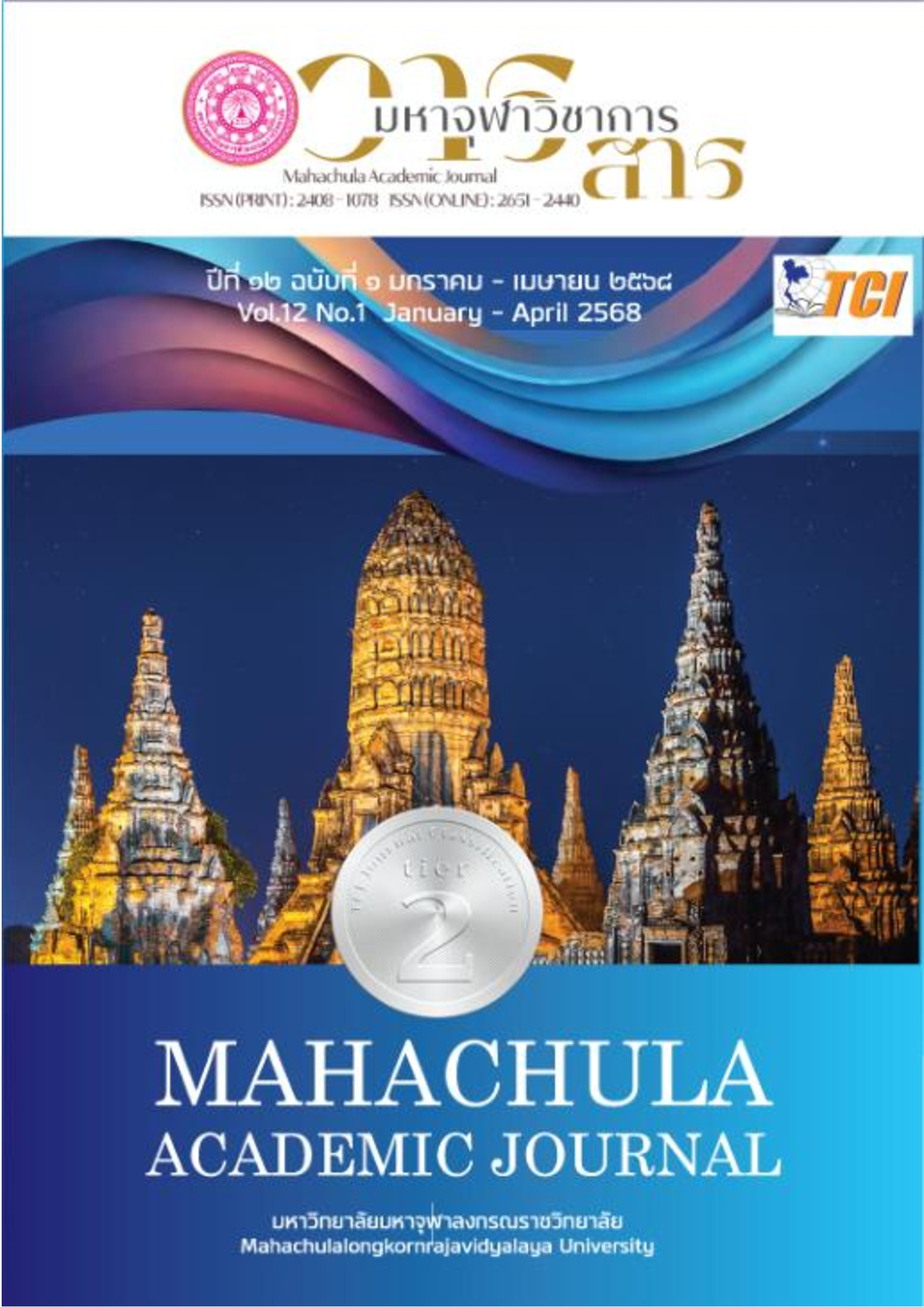An Analytical Study of the Value of Mettã in the Suvanฺnฺasãma Jãtaka
Main Article Content
Abstract
In this research, three objectives were purposely made: 1) to study mettã pãramĩ (the perfections of loving-kindness) in Buddhist scriptures, 2) to study the cultivation of mettã pãramĩ in the Suvanฺnฺasãma Jãtaka, and 3) to analyze the value of mettã in the Suvanฺnฺasãma Jãtaka. The study employed a documentary research method done by examining Buddhist scriptures and then the descriptive analysis was made accordingly.
The study found that mettã in Buddhist scriptures basically refers to loving-kindness, friendliness, and goodwill towards others and all sentient beings for happiness and prosperity. The development of mettã involves avoiding unwholesomeness and promoting wholesomeness to benefit practitioners and acquire enlightenment knowledge (bodhiñana). This enlightenment knowledge is divided into three levels: (1) the cultivation of mettã pãramĩ referring to the dedication of one’s wealth and servants, (2) the cultivation of mettã upapãramĩ referring to superior perfections by dedicating organs in one’s body, and (3) the cultivation of mettã paramatthapãramĩ referring to supreme perfections by devoting one’s life. Those who practice loving-kindness receive the following benefits: (1) peaceful sleep, (2) joyful awakenings, (3) no nightmares, (4) being loved by all human beings, (5) being beloved by all nonhuman beings, (6) being protected by all deities, (7) being safe from fire, poisons, and weapons, (8) having a concentrated mind, (9) having a bright face, (10) being mindful, and 11) attaining the Brahma world. The cultivation of mettã in the Suvanฺnฺasãma Jãtaka has begun since he was born as Bodhisatta Suvanฺnฺasãma where he recalled that parents were the creator of children, thus he treated them with affection and kindness in order to make their parents happy. Suvanฺnฺasãma still showed his loving-kindness and forgiveness to King Piliyakkha despite being wounded by a poisoned arrow that entered his right body and exited on the left side. Despite pain and blood spurting from his mouth, Suvanฺnฺasãma delivered the stanzas of loving-kindness to the King. In order to cultivate mettã toward animals, the environment, forests, and rivers, one must refrain from taking advantage of them, harming, destroying, and instead must preserve and protect them. According to the Suvanฺnฺasãma Jãtaka, mettã corresponds to value such as modesty, loving-kindness, forgiveness, patience, goodwill, and the cessation of vengeance. All of this will eventually lead to the way, fruition, and Nibbãna.
Article Details

This work is licensed under a Creative Commons Attribution-NonCommercial-NoDerivatives 4.0 International License.
References
ขันทอง วิชาเดช พระมหาสมบูรณ์ วุฑฺฒิกโร และประพันธ์ ศุภษร. “การแผ่เมตตาในสังคมไทยตามคัมภีร์พระพุทธศาสนาเถรวาท”. วารสารวิชาการมนุษยศาสตร์และสังคมศาสตร์ มหาวิทยาลัยบูรพา. ปีที่ ๒๗ ฉบับที่ ๕๕ (กันยายน-ธันวาคม ๒๕๖๒): ๓๐-๓๑.
ปรีดาพร คุ้มสระพรมและคณะ. “สัญลักษณ์ในนิทานคัมภีร์มังคลัตถทีปนี”. วารสารสันติศึกษาปริทรรศน์ มจร. ปีที่ ๑๑ ฉบับที่ ๔ (มิถุนายน ๒๕๖๖): ๑๓๓๓.
พระครูสมุห์วัยวุฒิ ชิตจิตฺโต และคณะ. “การประยุกต์หลักเมตตาในพระพุทธศาสนาเถรวาทเพื่อจัดการความขัดแย้ง”. วารสารสันติศึกษาปริทรรศน์ มจร. ปีที่ ๕ ฉบับพิเศษ (พฤษภาคม ๒๕๖๐): ๑๕๖-๑๕๘.
พระครูอุทัยสุตกิจ และสุวิชัย อินทกุล. “พุทธจริยธรรมเพื่อสิ่งแวดล้อมตามวิถีพุทธ”. วารสาร มจร การพัฒนาสังคม. ปีที่ ๖ ฉบับที่ ๑ (มกราคม-เมษายน ๒๕๖๔): ๒๒๙.
พระพรหมมังคลาจารย์ (หลวงพ่อปัญญานันทภิกขุ). อภัยทาน การให้ที่ยากยิ่ง: การให้ที่ยากและยิ่งใหญ่ที่สุดของมนุษย์. กรุงเทพมหานคร: ธรรมสภา, ๒๕๕๒.
พระมหาบุญเรียน ปภงฺกโร (พิลาพันธ์). “การศึกษาวิเคราะห์แนวความคิดเรื่องเมตตาในพุทธปรัชญาเถรวาท”. วิทยานิพนธ์พุทธศาสตรมหาบัณฑิต สาขาปรัชญา. บัณฑิตวิทยาลัย: มหาวิทยาลัยมหาจุฬาลงกรณราชวิทยาลัย, ๒๕๔๒.
พระมหาสมชาย ชินทตฺโต. “การศึกษาวิเคราะห์หลักธรรมที่ปรากฏในสุวรรณสามชาดก”. วารสารมหาจุฬาวิชาการ. ปีที่ ๘ ฉบับที่ ๒ (พฤษภาคม-สิงหาคม ๒๕๖๔): ๕๔-๕๕.
ภูมิพลอดุลยเดช. พระบาทสมเด็จพระปรมินทร. คำพ่อสอน: ประมวลพระบรมราโชวาทและพระราชดำรัสเกี่ยวกับความสุขในการดำเนินชีวิต. พิมพ์ครั้งที่ ๗. กรุงเทพมหานคร: โรงพิมพ์กรุงเทพ, ๒๕๕๑.
มหาจุฬาลงกรณราชวิทยาลัย. พระไตรปิฎกภาษาไทย ฉบับมหาจุฬาลงกรณราชวิทยาลัย. กรุงเทพมหานคร: โรงพิมพ์มหาจุฬาลงกรณราชวิทยาลัย, ๒๕๓๙.
มหาจุฬาลงกรณราชวิทยาลัย. อรรถกถาภาษาไทย ฉบับมหาจุฬาลงกรณราชวิทยาลัย. กรุงเทพมหานคร: โรงพิมพ์มหาจุฬาลงกรณราชวิทยาลัย, ๒๕๕๙.
สมเด็จพระญาณสังวร สมเด็จพระสังฆราช สกลมหาสังฆปริณายก. ชีวิตนี้สำคัญนัก, พิมพ์ครั้งที่ ๗, กรุงเทพมหานคร: อมรินทร์พริ้นติ้งแอนด์พับลิชชิ่ง, ๒๕๕๐.
สมเด็จพระญาณสังวร สมเด็จพระสังฆราช สกลมหาสังฆปริณายก. รสแห่งความเมตตาชุ่มเย็นยิ่งนัก. กรุงเทพมหานคร: ธรรมสภาและสถาบันบันลือธรรม, ๒๕๕๓.
สิทธิพล เวียงธรรม. “การอนุรักษ์สิ่งแวดล้อมวิถีพุทธ”. วารสารบัณฑิตศึกษามหาจุฬาขอนแก่น. ปีที่ ๖ ฉบับที่ ๔ (ตุลาคม-ธันวาคม ๒๕๖๒): ๑๔-๑๕.
สุภาพร พรมเถื่อน. “การศึกษาแนวคิดเรื่องอธิษฐานบารมีในคัมภีร์พระพุทธศาสนาเถรวาท”. วิทยานิพนธ์พุทธศาสตรมหาบัณฑิต สาขาวิชาพระพุทธศาสนา. บัณฑิตวิทยาลัย: มหาวิทยาลัยมหาจุฬาลงกรณราชวิทยาลัย, ๒๕๕๕.
สุรีย์ มีผลกิจ. พระพุทธประวัติ. พิมพ์ครั้งที่ ๒. กรุงเทพมหานคร: บริษัทคอมฟอร์ท จำกัด, ๒๕๔๔.
อุดม ชัยสุวรรณ และคณะ. “รูปแบบการพัฒนาภาวะผู้นำด้วยบารมี ๑๐ ทัศ ในพระพุทธศาสนาเถรวาท”. รมยสาร. ปีที่ ๑๓ ฉบับที่ ๑ (มกราคม-เมษายน ๒๕๕๘): ๕๕-๕๗.
ว.วชิรเมธี. ชีวจิตมีเดีย. “เมตตาธรรม: ประโยชน์ของเมตตา”. [ออนไลน์]. แหล่งที่มา: https://cheewajit. com/mind/157441.html [๙ มิถุนายน ๒๕๖๗].
สามเณร ปลูกปัญญาธรรม. สัมภาษณ์ พระราชปริยัติกวี (สมจินต์ วันจันทร์). “ความรักความเมตตาเป็นสิ่งสากล”. [ออนไลน์]. แหล่งที่มา: https://www.youtube.com/watch?v=h9fY4nGjF7o [๙ มิถุนายน ๒๕๖๗].


